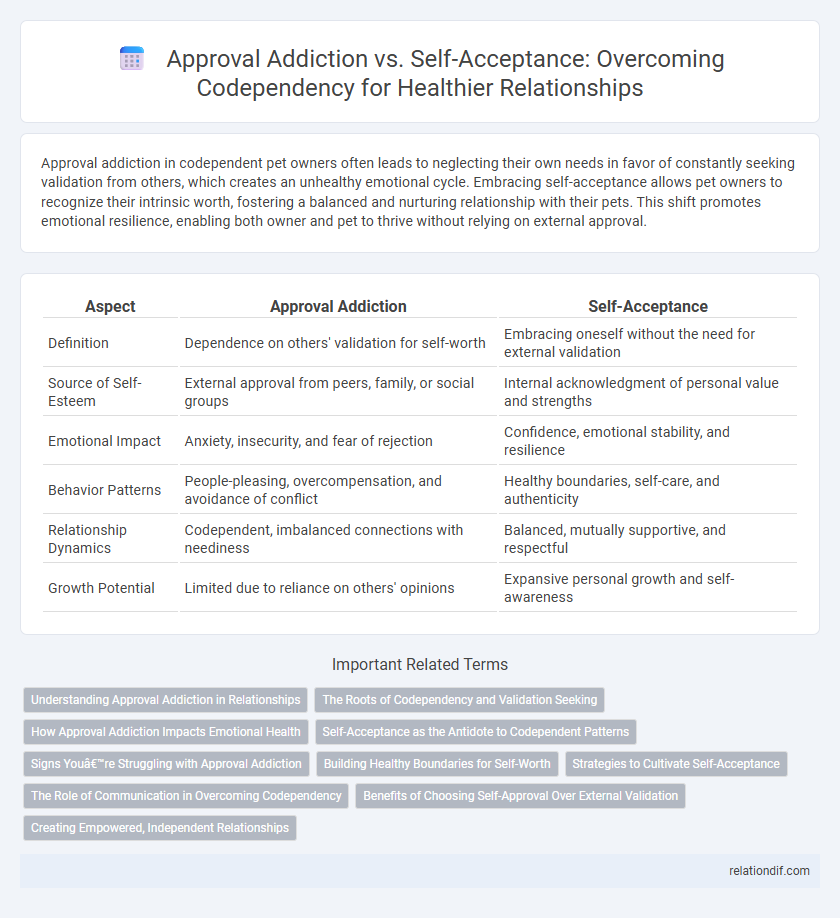Approval addiction in codependent pet owners often leads to neglecting their own needs in favor of constantly seeking validation from others, which creates an unhealthy emotional cycle. Embracing self-acceptance allows pet owners to recognize their intrinsic worth, fostering a balanced and nurturing relationship with their pets. This shift promotes emotional resilience, enabling both owner and pet to thrive without relying on external approval.
Table of Comparison
| Aspect | Approval Addiction | Self-Acceptance |
|---|---|---|
| Definition | Dependence on others' validation for self-worth | Embracing oneself without the need for external validation |
| Source of Self-Esteem | External approval from peers, family, or social groups | Internal acknowledgment of personal value and strengths |
| Emotional Impact | Anxiety, insecurity, and fear of rejection | Confidence, emotional stability, and resilience |
| Behavior Patterns | People-pleasing, overcompensation, and avoidance of conflict | Healthy boundaries, self-care, and authenticity |
| Relationship Dynamics | Codependent, imbalanced connections with neediness | Balanced, mutually supportive, and respectful |
| Growth Potential | Limited due to reliance on others' opinions | Expansive personal growth and self-awareness |
Understanding Approval Addiction in Relationships
Approval addiction in relationships manifests as an excessive need for validation from others, driving individuals to prioritize others' opinions over their own values and feelings. This compulsive behavior often leads to chronic anxiety, diminished self-worth, and an inability to set healthy boundaries. Cultivating self-acceptance empowers individuals to embrace their authentic selves, fostering resilience and emotional independence.
The Roots of Codependency and Validation Seeking
Approval addiction stems from deep-rooted codependency often linked to early experiences of conditional love and neglect, driving individuals to seek external validation for self-worth. Self-acceptance emerges when one recognizes and heals these origins, fostering internal validation and emotional autonomy. The constant need for approval is a symptom of unresolved attachment patterns and unmet emotional needs from childhood.
How Approval Addiction Impacts Emotional Health
Approval addiction causes emotional dependency on external validation, leading to chronic anxiety and low self-esteem. Individuals may suppress their true feelings to gain acceptance, which creates internal conflict and emotional exhaustion. Over time, this reliance on others' approval undermines authentic self-worth and disrupts emotional balance.
Self-Acceptance as the Antidote to Codependent Patterns
Self-acceptance disrupts codependent patterns by fostering intrinsic validation rather than reliance on others' approval, crucial for overcoming approval addiction. Embracing self-worth empowers individuals to establish healthy boundaries and reduces the compulsive need for external validation often seen in codependency. Cultivating self-compassion and internal affirmation serves as the antidote to approval addiction, promoting emotional resilience and authentic relationships.
Signs You’re Struggling with Approval Addiction
Constantly seeking validation from others, feeling anxious about being disliked, and basing your self-worth on external opinions are key signs of approval addiction. You may find it difficult to make decisions without reassurance or fear expressing opinions that could disappoint others. These behaviors contrast sharply with self-acceptance, which involves embracing your true self and valuing your own judgment regardless of outside approval.
Building Healthy Boundaries for Self-Worth
Approval addiction undermines self-worth by creating dependence on external validation, while self-acceptance fosters intrinsic value and emotional resilience. Building healthy boundaries protects personal integrity, enabling individuals to prioritize their needs without fear of rejection or guilt. Consistent boundary-setting reinforces self-worth and promotes authentic relationships grounded in respect and mutual understanding.
Strategies to Cultivate Self-Acceptance
Cultivating self-acceptance involves setting personal boundaries and practicing mindfulness to recognize intrinsic worth beyond external validation. Techniques such as journaling, positive self-talk, and seeking therapy help reframe negative thought patterns tied to approval addiction. Building self-compassion fosters resilience, reduces dependency on others' approval, and promotes authentic emotional well-being.
The Role of Communication in Overcoming Codependency
Effective communication plays a crucial role in overcoming codependency by fostering self-acceptance and reducing approval addiction. Clear, assertive expression of personal needs and boundaries helps individuals detach from others' opinions and build intrinsic self-worth. Developing communication skills enhances emotional independence, promoting healthier relationships free from reliance on external validation.
Benefits of Choosing Self-Approval Over External Validation
Choosing self-approval over external validation fosters emotional resilience, reducing anxiety linked to others' opinions. It cultivates intrinsic motivation, empowering authentic decision-making and personal growth. Enhanced self-acceptance promotes healthier relationships by setting boundaries rooted in genuine self-worth rather than seeking approval.
Creating Empowered, Independent Relationships
Approval addiction traps individuals in a cycle of seeking external validation at the cost of personal authenticity, weakening their ability to form healthy, independent relationships. Embracing self-acceptance fosters emotional resilience and empowers individuals to establish boundaries rooted in genuine self-worth rather than others' opinions. Cultivating self-acceptance transforms interactions into balanced partnerships, promoting mutual respect and authentic connection.
Approval addiction vs Self-acceptance Infographic

 relationdif.com
relationdif.com